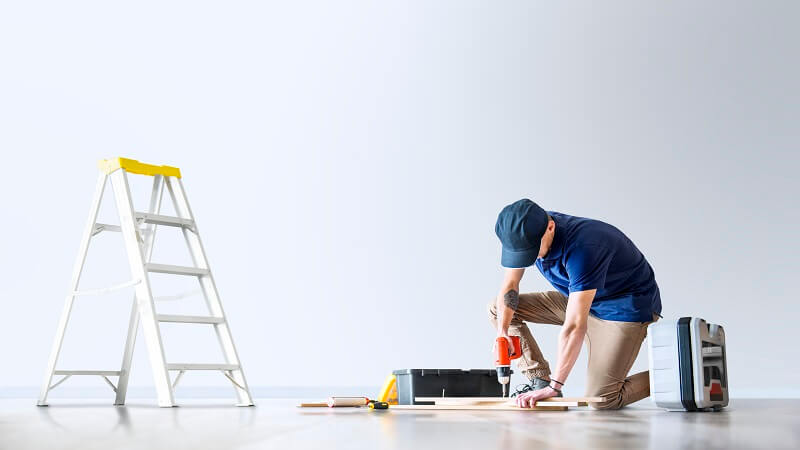Maintaining your home is a critical part of ensuring it remains a safe, comfortable, and valuable asset. Regular upkeep not only preserves the aesthetic appeal but also prevents costly repairs down the line. Here are eleven essential home maintenance tasks that every homeowner should perform regularly.
1. Inspect and Clean Gutters
Importance of Gutter Maintenance
Gutters play a vital role in directing rainwater away from your home’s foundation. Clogged or damaged gutters can lead to water damage, which can affect the foundation, roof, and interior walls.
How to Inspect and Clean
Inspect your gutters at least twice a year, typically in spring and fall. Remove leaves, twigs, and other debris by hand or with a gutter scoop. Use a hose to flush out any remaining dirt and check for leaks or damage. Repair or replace damaged sections promptly to ensure proper water flow.
2. Check the Roof
Why Roof Inspection is Crucial
Your roof is your home’s first line of defense against the elements. Regular inspections can identify issues like missing shingles, leaks, and damage caused by weather conditions.
Steps to Inspect Your Roof
Examine your roof from the ground using binoculars or climb up with a ladder for a closer look. Look for missing, damaged, or curling shingles, and check for moss or algae growth. Inspect flashing around chimneys, vents, and skylights for signs of wear. Address any issues immediately to prevent further damage.
3. Service Your HVAC System
Benefits of Regular HVAC Maintenance
Heating, ventilation, and air conditioning (HVAC) systems require regular maintenance to operate efficiently and prolong their lifespan. Proper upkeep ensures good indoor air quality and energy efficiency.
HVAC Maintenance Tips
Replace or clean air filters every 1-3 months, depending on the type and usage. Schedule professional HVAC inspections and servicing annually, ideally before the heating and cooling seasons. Clean vents and registers to ensure proper airflow and check for any unusual noises or odors.
4. Test Smoke and Carbon Monoxide Detectors
Importance of Detectors
Smoke and carbon monoxide detectors are essential for home safety, alerting you to potential fire hazards or harmful gas leaks. Regular testing ensures they function correctly.
How to Test and Maintain Detectors
Test smoke and carbon monoxide detectors monthly by pressing the test button. Replace batteries at least once a year, and replace the units themselves every 7-10 years. Clean the detectors with a vacuum or a soft brush to remove dust and debris.
5. Clean Dryer Vents
Dryer Vent Cleaning to Prevent Fires
Clogged dryer vents are a leading cause of household fires. Regular cleaning reduces this risk and improves your dryer’s efficiency.
Steps for Cleaning Dryer Vents
Disconnect the dryer and clean the lint trap after every use. Use a vacuum or dryer vent cleaning kit to remove lint buildup from the vent pipe and exhaust hood. Check for signs of wear or damage and replace any compromised sections.
6. Maintain Plumbing Systems
Prevent Plumbing Disasters
Regular plumbing maintenance helps avoid leaks, clogs, and water damage. It ensures a reliable supply of clean water and proper waste disposal.
Plumbing Maintenance Tips
Inspect pipes and fixtures for leaks or corrosion. Clear drains with a mixture of baking soda and vinegar followed by hot water to prevent clogs. Check water pressure and adjust if necessary. Have a professional inspect your water heater annually and flush it to remove sediment buildup.
7. Inspect Windows and Doors
Ensuring Energy Efficiency and Security
Windows and doors that are in good condition enhance your home’s energy efficiency and security. Regular inspections help identify issues like drafts, broken seals, or damage.
How to Inspect and Maintain Windows and Doors
Check for gaps or cracks around windows and doors and seal them with caulk or weatherstripping. Ensure locks and latches are functioning correctly. Clean window tracks and lubricate moving parts to ensure smooth operation. Replace damaged screens and repair or replace broken glass.
8. Maintain Exterior Paint and Siding
Protecting Your Home’s Exterior
Exterior paint and siding protect your home from the elements. Regular maintenance prevents damage and maintains your home’s curb appeal.
Exterior Maintenance Tips
Inspect your home’s exterior for peeling paint, cracks, or damage. Clean siding with a pressure washer or a hose and scrub brush. Touch up paint as needed, and consider repainting every 5-10 years, depending on the material and climate.
9. Service Your Garage Door
Ensuring Smooth Operation
A well-maintained garage door operates smoothly and safely. Regular servicing prevents breakdowns and extends the door’s lifespan.
Garage Door Maintenance Steps
Inspect the door’s hardware, including springs, cables, rollers, and tracks, for signs of wear or damage. Lubricate moving parts with a silicone-based lubricant. Test the door’s balance and safety features, such as the auto-reverse mechanism, to ensure they function correctly. Schedule professional maintenance annually.
10. Maintain Landscaping
Enhancing Curb Appeal and Functionality
Well-maintained landscaping adds beauty and value to your home. Regular care promotes healthy plants and prevents damage to your property.
Landscaping Maintenance Tips
Trim trees and shrubs to prevent overgrowth and remove dead branches. Mow the lawn regularly and keep it well-watered and fertilized. Mulch garden beds to retain moisture and suppress weeds. Inspect irrigation systems for leaks and proper operation.
11. Check Electrical Systems
Ensuring Electrical Safety
Regular electrical maintenance prevents potential hazards like fires and ensures the reliable operation of your home’s electrical systems.
Electrical Maintenance Tips
Inspect outlets, switches, and cords for damage or wear. Test ground fault circuit interrupters (GFCIs) monthly to ensure they function correctly. Replace burned-out bulbs and ensure fixtures are securely mounted. If you notice frequent tripped breakers or flickering lights, consult a licensed electrician.
Conclusion
Regular home maintenance is an investment in your property’s longevity, safety, and value. By performing these essential tasks, you can prevent major issues, save money on repairs, and ensure your home remains a comfortable and secure environment for years to come. Prioritize these maintenance tasks and create a schedule to keep your home in top condition year-round.
